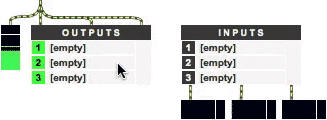https://github.com/delucis/cs.2click
:loud_sound: A Better Audio Router for a Modular System.
https://github.com/delucis/cs.2click
audio maxmsp modular music package signal utility
Last synced: about 1 month ago
JSON representation
:loud_sound: A Better Audio Router for a Modular System.
- Host: GitHub
- URL: https://github.com/delucis/cs.2click
- Owner: delucis
- License: gpl-3.0
- Created: 2015-02-27T20:51:42.000Z (over 10 years ago)
- Default Branch: master
- Last Pushed: 2018-05-17T21:50:11.000Z (about 7 years ago)
- Last Synced: 2025-02-05T08:51:05.221Z (5 months ago)
- Topics: audio, maxmsp, modular, music, package, signal, utility
- Language: Max
- Homepage:
- Size: 1.28 MB
- Stars: 12
- Watchers: 14
- Forks: 2
- Open Issues: 0
-
Metadata Files:
- Readme: README.md
- License: LICENSE.txt
Awesome Lists containing this project
- awesome-networked-media - cs.2click - A Better Audio Router for a Modular System in Max MSP. (Uncategorized / Uncategorized)
README
# cs.2click
A Better Audio Router for a Modular System.
* [What/why?](#whatwhy)
* [Functionality](#functionality)
* [Installation](#installation)
* [Compatibility](#compatibility)
* [License](#license)
## What/why?
Audio routing in a context that involves even a moderate number of potential nodes can get messy very quickly. Matrices that map inputs and outputs become unreadable with just a handful of rows and columns, while input/output selection embedded within modules degenerates into a stream of potentially tens of clicks to get your basic routing set up. The aim here is to build a better way of routing, designed for speed, ease, and clarity, hopefully making on-the-fly routing a less tedious experience. The inspiration is the two-click pattern used in [Ableton Live](https://www.ableton.com/), where the first click indicates one end of a signal flow and the second the other (HT [Sam Wolk](https://github.com/delta-6400)).
## Functionality

A simple interface of in- and output slots are provided by `[bpatcher]` modules `cs.2click-inputs` and `cs.2click-outputs`. These modules require a unique string as their first argument, naming the module. An optional second argument sets the number of slots that are available (between 1 and 8). If no second argument is provided, the modules default to a single slot.
Routing pairs are stored in a global dictionary named `cs.2click-routing-pairs`. This permits easy routing not only within a single Max patch, but also between patches.
The [README.maxpat](examples/README.maxpat) demonstrates basic functionality and also includes some information on getting up and running.
### Preset storage & recall
An additional abstraction `[cs.2click-presets]` permits you to store numbered presets and recall them by sending a preset’s index number. An argument provided to `[cs.2click-presets]` sets a filename to which you can save your preset (as a JSON file) and it will automatically try to load that file when the patch is opened. A “save” message will write your current presets to disk (in the same directory as the patch containing the abstraction).
This mechanism is built on a central `[dict]` object, which contains the stored presets. Messages whose meaning is not defined by the abstraction (`store`, `save`, `storagewindow`, `storage_close`, integers/floats) are passed on to this `[dict]`, permitting direct communication if desired. For example, using Max’s standard import/export messages one can load and save preset files that are not in the same directory as your patch.
Point 6 in the README.maxpat demonstrates the basic preset capabilities, and the [readme-presets.json](examples/readme-presets.json) file contains some example presets.
### Routing with messages
For cases where you need to control a system of cs.2click modules with messages, see the `[cs.2click-remote]` abstraction.
## Installation
Download the [latest release](https://github.com/delucis/cs.2click/releases/latest), to your Max packages folder. You can find this under `~/Documents/Max/Packages` for Max 6 or `~/Documents/Max 7/Packages` for Max 7.
## Compatibility
These modules have been tested with Max 6 and 7. They will not work with Max/MSP 5 or lower. Please report bugs under the issues tab above.
## License
This software is free to use, modify, and redistribute under a [GNU General Public License](http://www.gnu.org/licenses/gpl-3.0.txt).